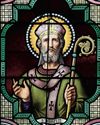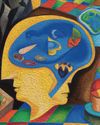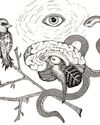
The most prominent dramatic distinction we’ve inherited from the Greeks is that between comedy and tragedy. Comedies end in marriages and happilyever-afters. Greek tragedies are also easy to identify, as they usually end with the death, imprisonment, despondency, or some other unraveling of the principal character(s). This is almost always due to some set of character flaws, or hamartia, from the Greek meaning ‘to err’.
One recurrent tragic set of character flaws revolves around hubris, which refers to an over-reaching mixture of pride and arrogance, generally against some divine force, entity, or hierarchy (it originally meant the use of bodily violence to shame a victim). Icarus is perhaps the most straightforward example of hubris. He’s a boy whose brilliant (and equally hubristic) father Daedalus crafts for him a pair of waxen wings in his desire to seize the power of flight from the gods, in order for them to escape imprisonment. But Icarus flies too close to the sun, his wings are melted, he falls, and is swallowed by the sea. Either ignorant or unconcerned with his mortality, in flying too close to the sun he has encroached upon the realm of the gods, and in doing so has lost touch with his own rationality, duty, and life. Icarus attempts to seize the heavens, and for this is lost forever to the depths. Similarly, Daedalus’ flight to freedom results in his losing his ideals and plunges his spirits to the depths: his son is dead, his invention destroyed, and although his body is freed, his spirit is broken.
This story is from the {{IssueName}} edition of {{MagazineName}}.
Start your 7-day Magzter GOLD free trial to access thousands of curated premium stories, and 9,000+ magazines and newspapers.
Already a subscriber ? Sign In
This story is from the {{IssueName}} edition of {{MagazineName}}.
Start your 7-day Magzter GOLD free trial to access thousands of curated premium stories, and 9,000+ magazines and newspapers.
Already a subscriber? Sign In

Anselm (1033-1109)
Martin Jenkins recalls the being of the creator of the ontological argument.

Is Brillo Box an Illustration?
Thomas E. Wartenberg uses Warhol's work to illustrate his theory of illustration.

Why is Freedom So Important To Us?
John Shand explains why free will is basic to humanity.

The Funnel of Righteousness
Peter Worley tells us how to be right, righter, rightest.

We're as Smart as the Universe Gets
James Miles argues, among other things, that E.T. will be like Kim Kardashian, and that the real threat of advanced AI has been misunderstood.

Managing the Mind
Roger Haines contemplates how we consciously manage our minds.

lain McGilchrist's Naturalized Metaphysics
Rogério Severo looks at the brain to see the world anew.

Love & Metaphysics
Peter Graarup Westergaard explains why love is never just physical, with the aid of Donald Davidson's anomalous monism.

Mary Leaves Her Room
Nigel Hems asks, does Mary see colours differently outside her room?

From Birds To Brains
Jonathan Moens considers whether emergence can explain minds from brains.